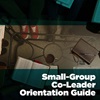"There is always a tendency of the body to sabotage the attention of the mind by providing some distraction," the poet Stephen Spender wrote. Who understands that better than a person in a small-group meeting who cannot focus on spiritual matters because of an uncomfortable atmosphere?
Here are several tips to remember when preparing the physical environment of your meeting to keep participants involved.
- Meet in a circle. Circles allow group members to see the faces of all other group members and invite everyone to participate. Plus, have everyone at the same eye level.
- Check the thermostat. It doesn't take many people in a room to increase the temperature. Consider lowering the temperature slightly before group members arrive.
- Sniff around. We can get so accustomed to the smells in our homes that we don't notice them anymore. Pets, things children spill, heavy perfumes, last night's dinner, and even room deodorizers can irritate people's noses. Consider lighting a few candles or simmering potpourri in the house during meetings. Peppermint is a great idea—research has shown it keeps people alert. But ask your group members if anyone has allergies to artificial scents.
- Make your meeting tasteful. Straight-from-the-oven brownies, popcorn, or a creatively arranged tray of fruit encourage group interaction. They also let people know that you want them there and that you planned ahead. Be creative and remember to provide healthy options and options for those with special dietary needs.
- Find the right room size. A small-group meeting may feel intimidating in a huge room. A group of 12 may feel claustrophobic in a small room. Experiment and find the right size for your group.
- Get close. Get as close as is comfortable. Being too spread out won't foster the right community feel.
- Let your light shine. But not too brightly. Low lamp lights are better than bright florescent lighting. If you meet in a classroom, try bringing a few table lamps and use them rather than the overhead lights. The lighting should be bright enough that everyone can read their Bibles, but low enough to feel cozy.
- Assure each person has a copy of what you're studying. Don't allow group members to share—one of them will be less involved in the discussion.
- Guard against distractions. Turn telephone ringers off (unless parents have children at babysitters and need to be contacted in case of an emergency). If children are being watched in the same house as the meeting, be sure they are as much out of hearing range as possible. Hire childcare providers whom parents can trust so they won't worry. Put pets in another room or outside. And turn off TVs, radios, and computers during the meeting.
—Michael Mack is founder of SmallGroups.com, a prolific writer of small-group resources, and the author of Small Group Vital Signs; used with permission from the author.









